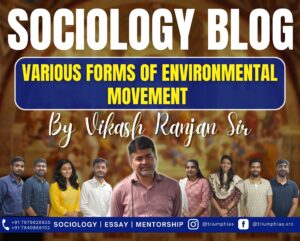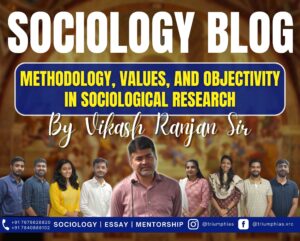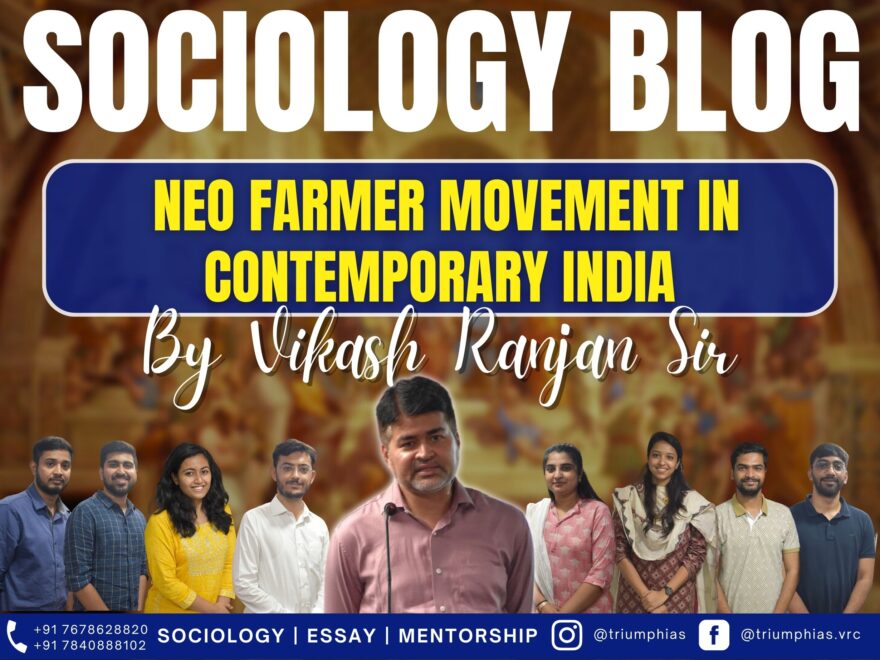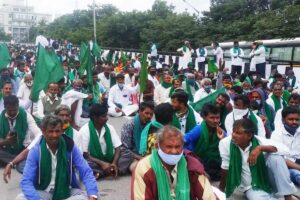Neo Farmer Movement in Contemporary India
(Relevant for Sociology Optional for Civil Services Examination)

Introduction:
India has a long history of of farmer movement dating back to colonial times. Those movements were generally considered as peasant movements. However it is being replaced with farmer movement for a simple reason that post-independence the development paradigm has made a new category of market oriented farmers. Recent reforms like green revolution, new technology and government subsidies have created a new category of rich farmers. The struggle of these farmers resorted to in recent years has been conceptualised as NEO FARMER MOVEMENT.
Reasons for Beginning of Neo Farmer Movement
- Terms of trade going against the agriculture
- Declining purchasing power
- Unremunerative prices
- Agricultural becoming losing proposition
- Increase in input prices
- Declining per capita income from agriculture
FEATURES OF NEO FARMER MOVEMENT.
- These movements do not believe in romanticising their life style or social life. They are more inclined to economic issues like protests for MSP, Debt waiver etc.
- They advocate transcending local boundaries, emphasizing internationalism over narrow nationalism.
- Unified and undifferentiated struggle is a key tenet, rejecting the division of social categories based on economic status. This stance prevents them from labelling their movement as solely representing affluent peasants, as they view all social segments aexperiencing poverty due to biased government policies.
- Their contention is that successive governments’ biased policies have led to growing rural poverty, leading them to assert that the “debt of the farmer” is a manufactured concept by the government. This declaration manifests in their call for “Kharja Mukti.”
- The core objective of the farmers’ movement is analysing backwardness through the lens of achieving fair prices for agricultural products. They believe that remunerative prices can trigger a trickle-down effect, ultimately eradicating rural poverty and underdevelopment.
- Gail Omvedt, a prominent researcher on peasant movements, argues that these movements present a novel perspective on exploitation. In contrast to traditional movements, they contend that exploitation is rooted in a larger market system that extends beyond localities, potentially encompassing national or even global markets.
- Use of new techniques: like social media ,music and gaining international tractions has been new methods to used by farmers in their movement.
Ideology of the Neo Farmer Movement
- Farmers’ movement lacks a singular ideology due to fundamental differences in addressing farmers’ issues.
- The Karnataka movement identifies as Gandhian, with some alignment to Dependency theory. It attributes Third World underdevelopment to post-colonial exploitation, including cheap goods, technology dumping, and urban-biased policies.
- Maharashtra’s Shetkari Sangathana stands out with its “Bharat versus India” ideology, emphasizing native and traditional values versus exploitation inherited from British colonial rule. Sharad Joshi argues that “India corresponds to that notional entity that has inherited from the British the mantle of economic, social, cultural educational exploitation; on the contrary “Bharat” is that notional entity which is subject to exploitation a second time even after the termination of the external colonial regime
- The movement critiques state intervention and supports economic freedom for farmers’ prosperity.
Social base and related criticism of neo farmer movement
- These Neo farmer movement are often criticised for their class bias . The Neo Farmer movement are often criticised for their class bias. It is often argued that the Neo Farmer movement is highly biased towards market-oriented farmers than those who are living in the subsistence economy. All through their struggles, these movements have raised such issues which have helped either the rich farmers or the middle farmers. For example, their argument in favour of writing off loans, remunerative prices, declaring agriculture as an industry, abolition of tractor loans etc. ultimately helped the big or the rich/middle peasantry or the farmers.
- Even the movements have not addressed the issues beyond irrigated are The issues of non-irrigated areas have received scant focus in their discourse.
- It is also said that these movements have never become all caste movement. For example Punjab and Uttar Pradesh movement has become JAT movement. In Tamil Nadu there is very low representation of Dalits and Muslims.
- Nonetheless they have not been effective in bringing radical transformation in the country side. This is because of the fact that the neo farmer movement, from the very beginning, were unable to overcome the internal conflicts as well as contradictions. Secondly, they did not carry any radical agenda from within- for example they never bothered to demand radical land reforms, nor were they concerned about the atrocities perpetrated on marginal classes including the Dalits in the country side.
Conclusion:
The neo farmer movement did bring about a paradigm shift in the discourse, analysis and perception about farmers in India. It made the policy makers to address the deep rooted crisis of agriculture as well as agrarian classes in India. It has also helped the farmers to be a part of international movement against such issues as globalisation, imperialism and capitalism.

To master these intricacies and fare well in the Sociology Optional Syllabus, aspiring sociologists might benefit from guidance by the Best Sociology Optional Teacher and participation in the Best Sociology Optional Coaching. These avenues provide comprehensive assistance, ensuring a solid understanding of sociology’s diverse methodologies and techniques.
META TAGS: Neo Farmer Movement, farmer movement sociology, Farmer movement upsc, Neo Farmer Movement Sociology Optional, Farmer movement in India, farmer movements in contemporary India Neo Farmer Movement, farmer movement sociology, Farmer movement upsc, Neo Farmer Movement Sociology Optional, Farmer movement in India, farmer movements in contemporary India Neo Farmer Movement, farmer movement sociology, Farmer movement upsc, Neo Farmer Movement Sociology Optional, Farmer movement in India, farmer movements in contemporary India
 |
 |
Explore Sociology Optional Syllabus
Paper-1
FUNDAMENTALS OF SOCIOLOGY
- Sociology – The Discipline
- Sociology as Science:
- Research Methods and Analysis:
- Sociological Thinkers:
- Karl Marx- Historical materialism, mode of production, alienation, class struggle.
- Emile Durkheim- Division of labour, social fact, suicide, religion and society.
- Max Weber- Social action, ideal types, authority, bureaucracy, protestant ethic and the spirit of capitalism.
- Talcott Parsons- Social system, pattern variables.
- Robert K. Merton- Latent and manifest functions, conformity and deviance, reference groups.
- Mead – Self and identity.
- Stratification and Mobility:
- Concepts- equality, inequality, hierarchy, exclusion, poverty and deprivation.
- Theories of social stratification- Structural functionalist theory, Marxist theory, Weberian theory.
- Dimensions – Social stratification of class, status groups, gender, ethnicity and race.
- Social mobility- open and closed systems, types of mobility, sources and causes of mobility.
- Works and Economic Life:
- Social organization of work in different types of society- slave society, feudal society, industrial /capitalist society
- Formal and informal organization of work.
- Labour and society.
- Politics and Society:
- Sociological theories of power.
- Power elite, bureaucracy, pressure groups, and political parties.
- Nation, state, citizenship, democracy, civil society, ideology.
- Protest, agitation, social movements, collective action, revolution.
- Religion and Society:
- Sociological theories of religion.
- Types of religious practices: animism, monism, pluralism, sects, cults.
- Religion in modern society: religion and science, secularization, religious revivalism, fundamentalism.
- Systems of Kinship:
- Family, household, marriage.
- Types and forms of family.
- Lineage and descent.
- Patriarchy and sexual division of labour.
- Contemporary trends.
- Social Change in Modern Society:
- Sociological theories of social change.
- Development and dependency.
- Agents of social change.
- Education and social change.
- Science, technology and social change.
Paper-2
INDIAN SOCIETY: STRUCTURE AND CHANGE
INTRODUCING INDIAN SOCIETY
- Perspectives on the study of Indian society:
- Indology (GS. Ghurye).
- Structural functionalism (M N Srinivas).
- Marxist sociology (A R Desai).
- Impact of colonial rule on Indian society :
- Social background of Indian nationalism.
- Modernization of Indian tradition.
- Protests and movements during the colonial period.
- Social reforms.
SOCIAL STRUCTURE
- Perspectives on the study of Indian society:
- The idea of Indian village and village studies.
- Agrarian social structure – evolution of land tenure system, land reforms.
- Caste System:
- Perspectives on the study of caste systems: GS Ghurye, M N Srinivas, Louis Dumont, Andre Beteille.
- Features of caste system.
- Untouchability – forms and perspectives.
- Tribal communities in India
- Definitional problems.
- Geographical spread.
- Colonial policies and tribes.
- Issues of integration and autonomy.
- Social Classes in India:
-
- Agrarian class structure.
-
-
- Industrial class structure.
- Middle classes in India.
-
- Systems of Kinship in India:
- Lineage and descent in India.
- Types of kinship systems.
- Family and marriage in India.
- Household dimensions of the family.
- Patriarchy, entitlements and sexual division of labour
- Religion and Society:
- Religious communities in India.
- Problems of religious minorities.
- Patriarchy, entitlements and sexual division of labour
SOCIAL CHANGES IN INDIA
- Visions of Social Change in India:
- Idea of development planning and mixed economy
- Constitution, law and social change.
- Education and social change.
- Rural and Agrarian transformation in India:
- Programmes of rural development, Community Development Programme, cooperatives,poverty alleviation schemes
- Green revolution and social change.
- Changing modes of production in Indian agriculture.
- Problems of rural labour, bondage, migration.
3. Industrialization and Urbanisation in India:
-
- Evolution of modern industry in India.
- Growth of urban settlements in India.
- Working class: structure, growth, class mobilization.
- Informal sector, child labour
- Slums and deprivation in urban areas.
4. Politics and Society:
-
- Nation, democracy and citizenship.
- Political parties, pressure groups , social and political elite
- Regionalism and decentralization of power.
- Secularization
5. Social Movements in Modern India:
-
- Peasants and farmers movements.
- Women’s movement.
- Backward classes & Dalit movement.
- Environmental movements.
- Ethnicity and Identity movements.
6. Population Dynamics:
-
- Population size, growth, composition and distribution
- Components of population growth: birth, death, migration.
- Population policy and family planning.
- Emerging issues: ageing, sex ratios, child and infant mortality, reproductive health.
7. Challenges of Social Transformation:
-
- Crisis of development: displacement, environmental problems and sustainability
- Poverty, deprivation and inequalities.
- Violence against women.
- Caste conflicts.
- Ethnic conflicts, communalism, religious revivalism.
- Illiteracy and disparities in education.
Why Vikash Ranjan’s Classes for Sociology?
Proper guidance and assistance are required to learn the skill of interlinking current happenings with the conventional topics. VIKASH RANJAN SIR at TRIUMPH IAS guides students according to the Recent Trends of UPSC, making him the Best Sociology Teacher for Sociology Optional UPSC.
At Triumph IAS, the Best Sociology Optional Coaching platform, we not only provide the best study material and applied classes for Sociology for IAS but also conduct regular assignments and class tests to assess candidates’ writing skills and understanding of the subject.
Choose The Best Sociology Optional Teacher for IAS Preparation?
At the beginning of the journey for Civil Services Examination preparation, many students face a pivotal decision – selecting their optional subject. Questions such as “which optional subject is the best?” and “which optional subject is the most scoring?” frequently come to mind. Choosing the right optional subject, like choosing the best sociology optional teacher, is a subjective yet vital step that requires a thoughtful decision based on facts. A misstep in this crucial decision can indeed prove disastrous.
Ever since the exam pattern was revamped in 2013, the UPSC has eliminated the need for a second optional subject. Now, candidates have to choose only one optional subject for the UPSC Mains, which has two papers of 250 marks each. One of the compelling choices for many has been the sociology optional. However, it’s strongly advised to decide on your optional subject for mains well ahead of time to get sufficient time to complete the syllabus. After all, most students score similarly in General Studies Papers; it’s the score in the optional subject & essay that contributes significantly to the final selection.
“A sound strategy does not rely solely on the popular
Opinion of toppers or famous YouTubers cum teachers.”
It requires understanding one’s ability, interest, and the relevance of the subject, not just for the exam but also for life in general. Hence, when selecting the best sociology teacher, one must consider the usefulness of sociology optional coaching in General Studies, Essay, and Personality Test.
The choice of the optional subject should be based on objective criteria, such as the nature, scope, and size of the syllabus, uniformity and stability in the question pattern, relevance of the syllabic content in daily life in society, and the availability of study material and guidance. For example, choosing the best sociology optional coaching can ensure access to top-quality study materials and experienced teachers. Always remember, the approach of the UPSC optional subject differs from your academic studies of subjects. Therefore, before settling for sociology optional, you need to analyze the syllabus, previous years’ pattern, subject requirements (be it ideal, visionary, numerical, conceptual theoretical), and your comfort level with the subject.
This decision marks a critical point in your UPSC – CSE journey, potentially determining your success in a career in IAS/Civil Services. Therefore, it’s crucial to choose wisely, whether it’s the optional subject or the best sociology optional teacher. Always base your decision on accurate facts, and never let your emotional biases guide your choices. After all, the search for the best sociology optional coaching is about finding the perfect fit for your unique academic needs and aspirations.
Follow us :
🔎 https://www.instagram.com/triumphias
🔎https://www.youtube.com/c/TriumphIAS
https://t.me/VikashRanjanSociology
Find More Blogs
|
Scope of the subject and comparison with other social sciences |
|||
|
|
|
|
Modernity and social changes in Europe |



2 comments